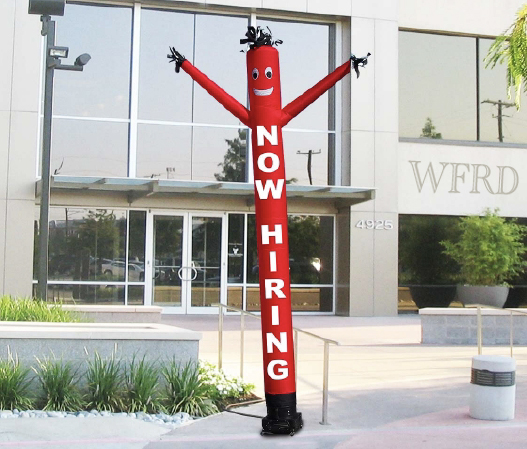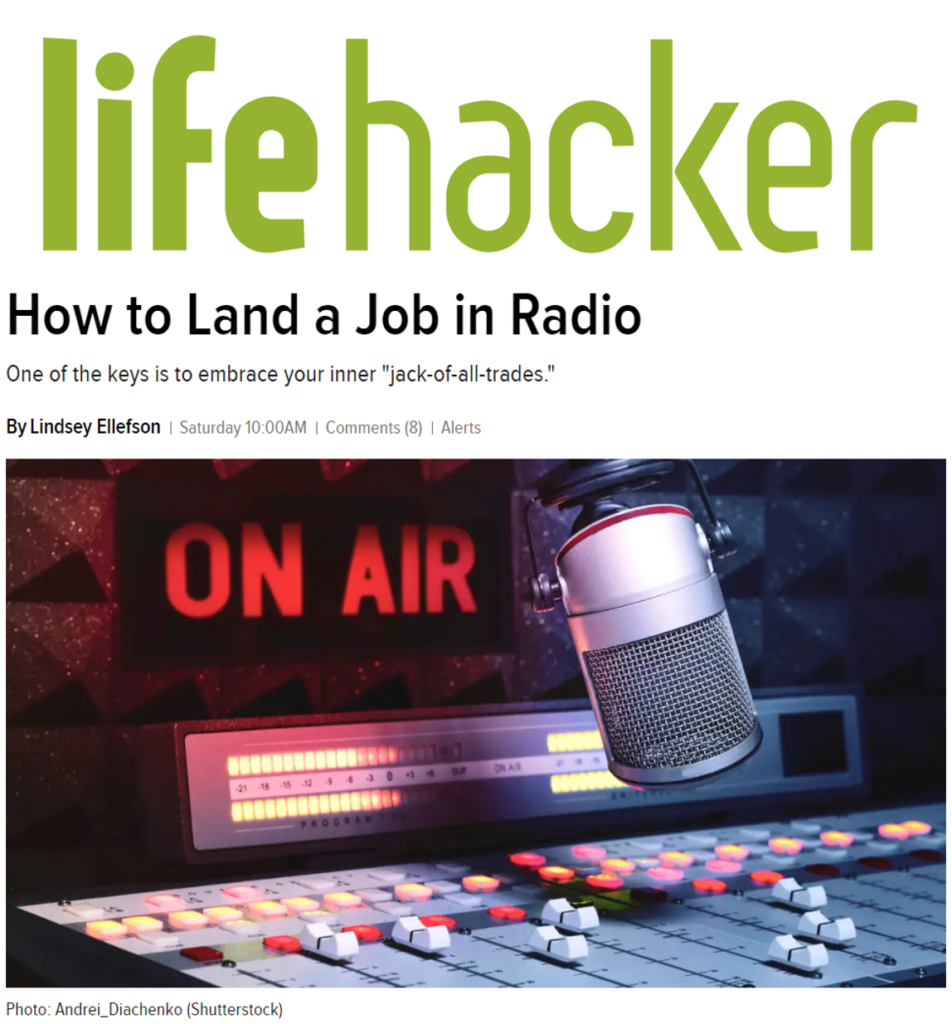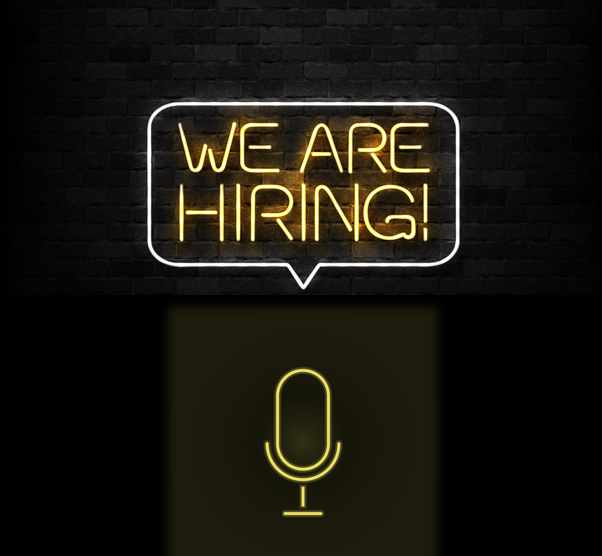
Everywhere you go, you see all those “Now Hiring” signs. It seems like every retail business is searching for help. As we struggle to return to “normal,” more and more businesses are staffing up. There is still lots of 2021 left – an entire two quarters – and many organizations and companies believe there’s more opportunity for growth and expansion.
Outside of broadcast radio.
True, many companies have off-loaded, furloughed, and terminated conventional radio jobs, while searching elsewhere for digital expertise in the other end of the building. But overall, the air talent population in the U.S. continues to head downward.
Nobody tracks the comings and goings of air personalities. So, while there’s no “census” among radio’s on-air pros, there are other indicators that might explain the downtrend of hiring talent.
Our AQ3 study just out of the field may provide some key indicators. This is a research study we conduct in partnership with Morning Show Boot Camp. Our first studies were in 2018 and 2019, and each broke the 1,000 respondents mark with little or no perspiration.
Camp. Our first studies were in 2018 and 2019, and each broke the 1,000 respondents mark with little or no perspiration.
We took 2020 off for obvious reasons, and launched this year’s study just a few weeks ago. Our sample this year? Just 601 respondents.
Now that’s not a bad sample. In fact, it’s more robust than most perceptual studies. It’s the equivalent of a half dozen music tests.
But it’s a far cry from the sample size we became accustomed to just a few short years ago. And we made the same efforts to encourage participation as we did in years past.
Are there other factors at play here? Of course. The COVID malaise, a summertime survey during a high travel period, and the reality that many personalities are wearing a lot of hats these days. (We even measured that in AQ3 – how many different tasks air personalities are responsible for – and it’s an eye-opener.)
And to learn more about what it’s like for ex-radio personalities to find themselves “on the beach” with few prospects of respectable work, we created a sub-sample – our version of “pros on the loose.” There are 60 of them, and I look forward to hearing their stories, and learning how they might differ attitudinally from their friends and former colleagues who are gainfully employed.
I speak to them all the time, trying to provide leads at best and encouragement at worst. It is more than a little ironic that so many sectors in our now-booming economy are hiring in large numbers, while broadcast radio remains an anomaly. It is hard to find a good position behind the mic in 2021.
So, when I ran across this headline on the Lifehacker website, you can imagine my surprise:

You’re forgiven if you think it’s a joke – something out of The Onion perhaps. That was, in fact, my initial reaction.
But no, it’s the real deal. Lifehacker is not a new digital enterprise. It launched in 2005, and its slogan – “Do everything better” – sums up its mission as a site/blog specializing in life hacks and tips.
Lifehacker covers a lot of ground, from software workarounds and hacks, to general life tips to help its readers get through the confusion and the clutter. A few recent columns include:
- You Can Make a Shockingly Delicious Pasta Sauce With Cucumbers

- 5 Ways to take Long Screenshots on Your iPhone
- Check if the Spices in Your Pantry Are Part of a Major Recall
Practical, basic advice about everyday tasks and activities.
So, a headline – or call it a hack – about how to find a radio job? I did a double-take. Is Lifehacker simply running out of topics?
When I clicked on the link to see how to get hired in radio, there was reasonable advice from radio personalities and programmers, culled by writer Lindsey Ellefson.
Overall, the tips in the article are basic – aimed at people who have never worked in radio before – but they are pretty sound;
- Go to a trade school or seek out special educational programs specializing in radio
- Try to get a wide variety of experience learning many jobs around the station
- Be patient – it takes time; network, stay focused, have fun
- “Think outside the boombox” (ouch) – Use social media to promote and market yourself: your brand
A number of comments follow from people in and out of the industry. As you can imagine, they run the gamut.
When I see this kind of story, I cringe a bit. How do you explain to someone outside the business what it’s like, especially as conditions have changed so much in recent years? Who would run a story about finding a job in an industry that is steadily decreasing the size of its on-air workforce?
And I wonder what our “on the beach” crowd would say to excited radio wannabes who read Ellefson’s story, and get pumped up about a career behind the mic, in a sales cubicle, running traffic logs, or digitally supporting a station.
But once my cynicism abated, I was thankful to Ellefson for writing this column. I’m thinking the demos on the Lifehacker site are mostly under 40 and even younger – the kind of consumers who think you can pretty much find any answers you want online.
and even younger – the kind of consumers who think you can pretty much find any answers you want online.
And many of them may be seeking out a meaningful career, switching industries, or reassessing their career paths – especially after a year we’ve all experienced.
If a career in radio is alongside the modern, contemporary topics covered in Lifehacker, then I’m down with that, too.
These days, it is becoming all too common for the response to “I work in radio” to be “Who even listens to a radio anymore?” or my favorite, “My kids don’t even know what a radio is.”
So, if Ellefson’s tips on nailing down a career behind the mic in broadcast radio lead to conversations, and even young people deciding to give this radio thing a try, all the better.
For those of you with hiring power, the next time a resume lands on your desk from a newbie who says they’re interested in radio, ask them how they decided to pursue this route.
And you never know – they may say they read about it in Lifehacker.
You can read the Lifehacker story here.
Join me at Morning Show Boot Camp 33 in Chicago, August 12-13 to see two great days of panels, sessions, and keynotes for on-air talent. I’ll be debuting the findings of AQ3 at the conference. Info here.
- What To Do If Your Radio Station Goes Through A Midlife Crisis - April 25, 2025
- A 2020 Lesson?It Could All Be Gone In A Flash - April 24, 2025
- How AI Can Give Radio Personalities More…PERSONALITY - April 23, 2025




Let’s see: Ice man … gas lamp lighter … piano tuner … soap maker … telegraph operator … stable-keeper … collar-stitcher … typist …
“Radio Personality”?
Nope, not yet. The world still needs entertainers. It’s too early to chuck our job on that pile of obsolete occupations from another time.
Exactly, my friend. You cannot quantify talent, or even teach it.
Fred, I couldn’t help noticing the WFRD call-letters you creatively placed on your building. Are you aware that WFRD is a REAL station on a commercial frequency of 99.3 as a commercial rock station at Dartmouth College in Hanover, New Hampshire? Well, at least it’s a 6,000 watt FM ROCK station!
If ANYONE knows…ART knows!
They don’t call him Radio’s Best Friend for nothing, JC.
What a great set of call letters, Art? (I hope the real WFRD doesn’t send me a cease & desist!) The fact they’re a ROCK station is a wonderful coincidence, right?
I was noticing that in my home town of Miami, a morning personality I follow on Twitter does a 6 hour shift, from 6am to noon. Here in Austin, at the local talk station, The PD does morning news and is co-host for midday on a split shift (I think it’s 10-11 am and 2-4pm) His co-host does the traffic pretty much all day. So this begs the question, why would anyone want any of these jobs?
They like wearing lots of hats?
Radio career has become an oxymoron. Radio jobs have always been better than radio careers, but now both are pretty sketchy.
I would have a hard time recommending radio as a career for someone not already in it – and even then, if there’s a decent off ramp from radio for anyone currently working there, I’d recommend taking a serious look at it. Emotions and past glories aside, what kind of future is there in a business where no matter what you do, there will be fewer people doing it next year and fewer than that the year after next? And less use, less revenue along with lots of well funded competition increasingly encroaching on what used to be unique to radio.
Honestly, its amazing to me they can still find people to take radio jobs and I sure wouldn’t suggest it as a career path. Radio was a great gig once upon a time and for some a career. Is either true anymore?
I LOVE the Lifehacker article! I love the overall hope and enthusiasm.
In a lot of ways, it’s really preaching–but to a much younger congregation just starting out–the same things we’ve always preached: hang around stations, do trade schools, take any jobs, absorb all you can and be prepared for that moment when a shift needs covering!
I also loved (for some reason) that the very next article was, “You’re Probably Overcooking Your Corn”! How do you not love a site with that much range??
And then of course, I loved WFRD!
What an upper of a post today! Thanks! Now if you’ll excuse me, I need to check my corn!
Let me know how the corn comes out, Dave!
So there was a kernel of truth….
LOL! Corn humor. Aw, shucks!